Health and Nutrition
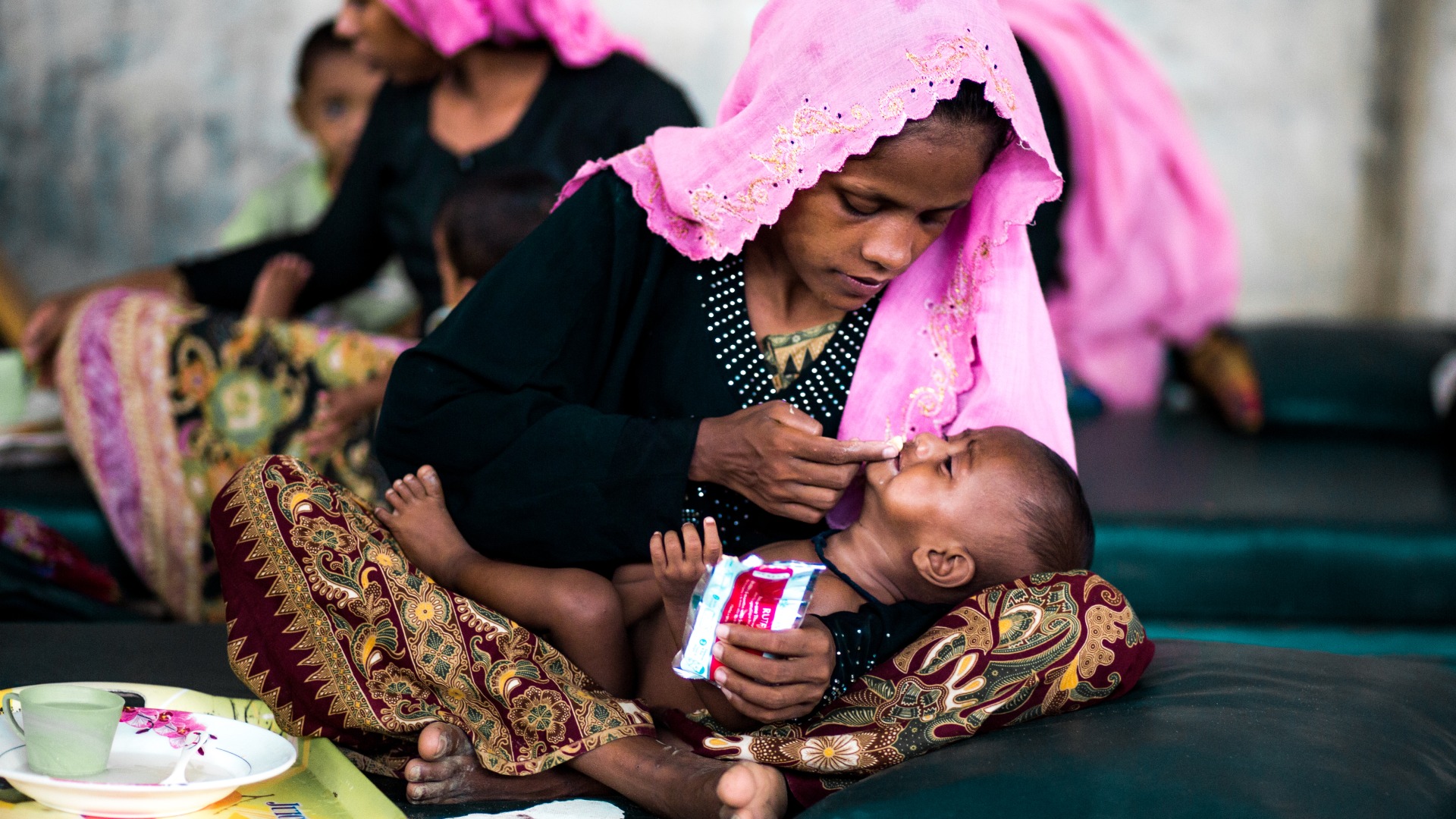
Health sector in Bangladesh continues to grapple with the existing issues of increasing access to improving quality of achieving equity in health care services for all. Along with Government NGOs are contributing in achieving Sustainable Development Goal (SDG) no. 3 in the health sector.
To achieve SDG in health sector RIC is contributing in the following areas:
- Enhancing access to health services by the poor people
- Reducing maternal and infant mortality rate
- Promoting skilled birth attendance
- Reducing adolescent birth rate
- Case detection and providing appropriate treatment for tuberculosis
- Improving overall nutrition situation including underweight and stunting
- Improving service quality, standardization and accreditation for quality of care
In the reporting year health service delivery interventions 1.83 million (Approx) People through the Children, Adolescent, Reproductive Aged People Projects.
Through following programs interventions:
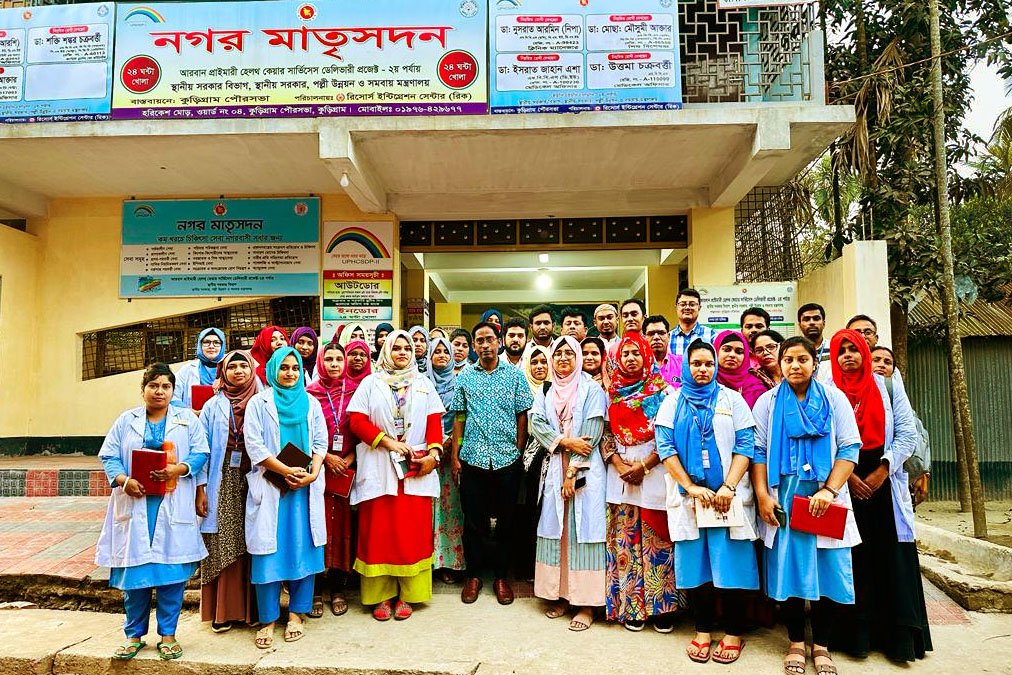 Urban Primary Health Care Service Delivery Project (UPHCSDP-II) : Urban Primary Health Care Services Delivery Project, a Public-Private Partnership is an innovative initiative with the project aims to improve access, equity, quality, utilization and institutional sustainability of urban primary health care (PHC) services in all city corporations and selected municipalities, particularly for the poor, women and children.
Urban Primary Health Care Service Delivery Project (UPHCSDP-II) : Urban Primary Health Care Services Delivery Project, a Public-Private Partnership is an innovative initiative with the project aims to improve access, equity, quality, utilization and institutional sustainability of urban primary health care (PHC) services in all city corporations and selected municipalities, particularly for the poor, women and children.
The project is funded by Asian Development Bank (ADB) through the Local Government Division (LGD) of the Ministry of Local Government, Rural Development and Cooperatives.
RIC has been implementing the project in Shariatpur Municipality and Kurigram Municipality , started from January 2022. The project is serving through 1 Comprehensive Reproductive Health Care Center (CRHCC), 2 Primary Health Care Center (PHCC) and 04 Satellite Clinic. Statics clinics are equipped with OT, Diagnostic Lab, Stay Ward, and Others clinical facilities
Major components of this project include; Comprehensive Reproductive Health care Services, Family Planning, Adolescent Reproductive health care, Child health care, Limited curative care, Communicable disease control program. Providing red cards to the poorest for free health services is a uniqueness that increased poor community’s access to health services by the project. To ensure free health service among the poor and ultra poor a household survey has been conducted in the project area.
The Project covers a population of around 2.5 Lac nd have a great role of increasing coverage of safe delivery, anti-natal and post-natal care, new born health, immunization of children etc.
This health service model has created positive impact amongst the urban community through availing low-cost services from CRHCC, PHCC with modern facilities, easy access of health facilities from Satellite Clinics.
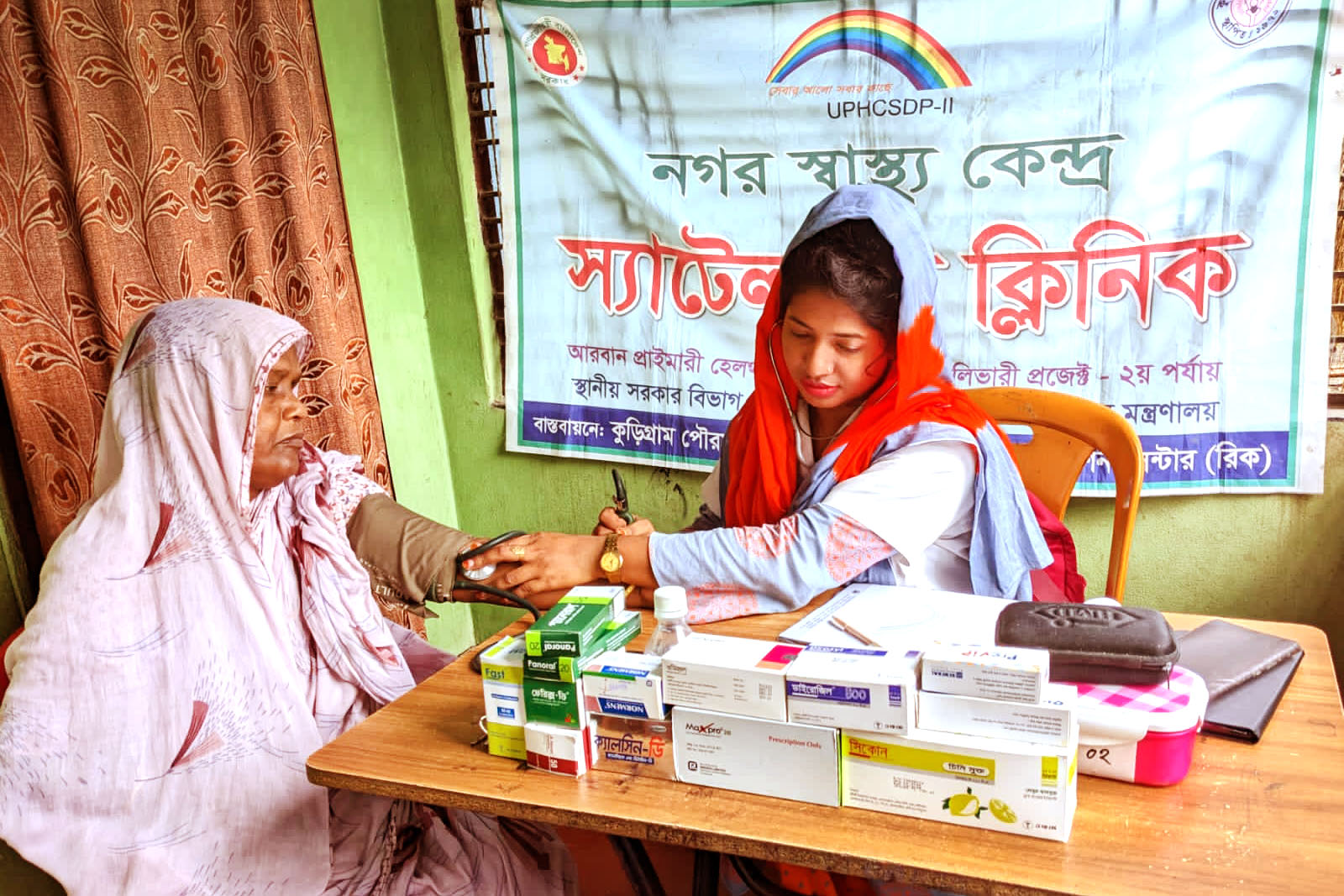
Special events during the period :
- Participation in the Covid -19 Vaccine campaign
- Participation in the Vitamin-A+ campaign
- Observation of father of the Nation’s Birth Anniversary and International Children Day
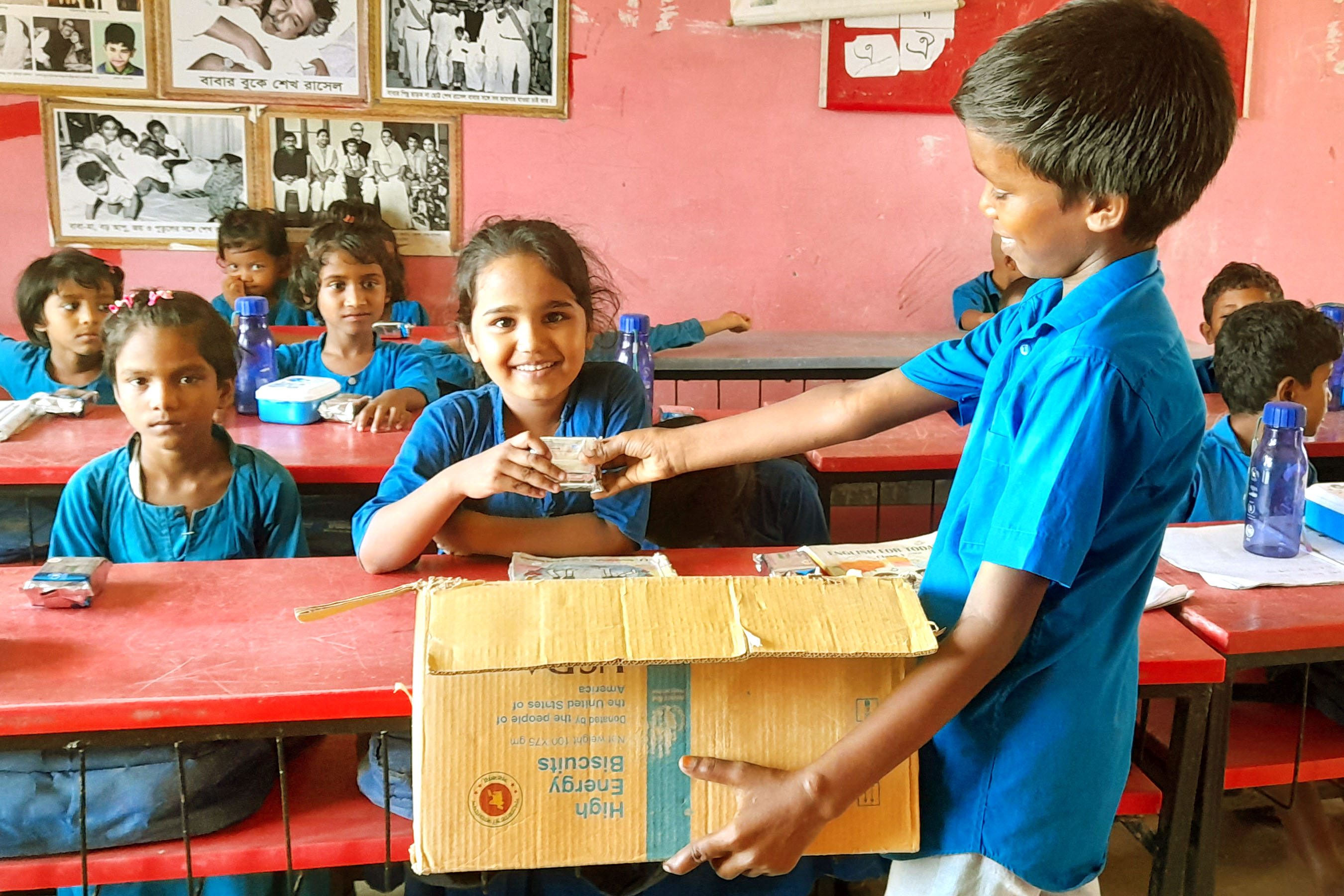 McGoven. Dole Food for Education and Child Nutrition Program (SFP)): RIC has been implementing the program in Ukiiya, Kutubdia, Mohesh khali and Pekua Upazila of Cox's Bazar districts with the financial and technical support of WFP as a program of the Ministry of Primary and Mass Education of the Bangladesh Government, where in Ukhiya and Kutubdia the program is supported by the McGovern-Dole International Food for Education and Child Nutrition Program.
McGoven. Dole Food for Education and Child Nutrition Program (SFP)): RIC has been implementing the program in Ukiiya, Kutubdia, Mohesh khali and Pekua Upazila of Cox's Bazar districts with the financial and technical support of WFP as a program of the Ministry of Primary and Mass Education of the Bangladesh Government, where in Ukhiya and Kutubdia the program is supported by the McGovern-Dole International Food for Education and Child Nutrition Program.
Under the program fortified biscuits are distributed to primary school students to ensure they receive key micro nutrients to support their overall development and help to achieve the country’s quality primary education targets. The biscuits provide 323 calory per day and help children meet 71 percent of their daily micro nutrient needs. Provided free of charge, the biscuits also provide parents with an incentive to keep boys and girls in school. The school feeding program also delivers an "essential learning package" to parents, teachers, school management committees, children, and community members. Activities include water and sanitation, health and nutrition education and establishment of school vegetable gardens. Women are actively engaged in school management committees to enhance their leadership and standing within the wider community.
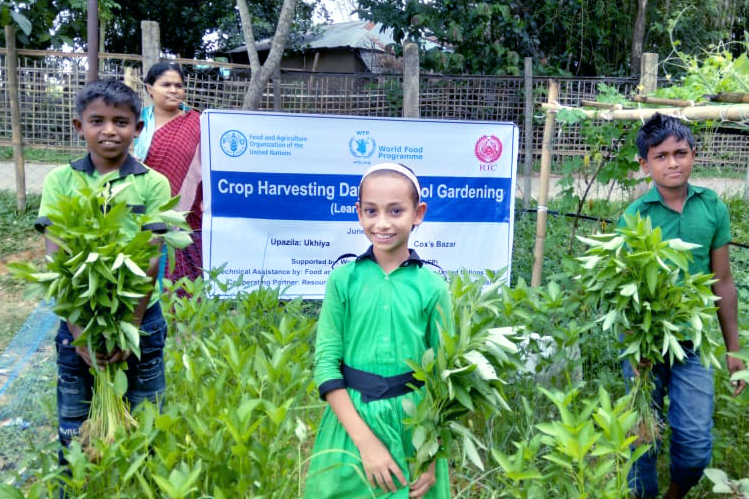
The school feeding program also delivers an "essential learning package" to parents, teachers, school management committees, children and community members. Activities include water and sanitation, health and nutrition education, and the establishment of school vegetable gardens.
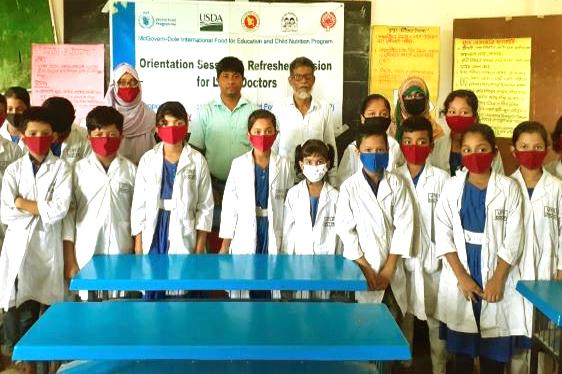
Orientation and Refresher session for Little Doctors
Distributed of above mentioned food items were important interventions such those were Training and Refresher on School Feeding Programme, Training for Little Agriculturists Aprons and Hand Gloves,Tiffin Boxes and Water Bottles distribution among Students, Orientation and Refresher for Little Doctors, Essential Learning Package orientation sessions National Deworming Campaign, Support to Establish Vegetable Gardens ,Demonstration on Healthy Meal Preparation, Health and Hygiene Session, Conduction Disability inclusion initiatives Peer/Buddy Support System for Children with Disabilities.
As a result, School enrollment remained stable at 100 percent, while attendance at class and dropout rates decreased. By disseminating health information, awareness among students and their families on health, hygiene, and nutrition increased, and they became more aware of the importance of this food commodity and its’ impact on education. Enhanced Commitment to Women (ECW) by encouraging them in active participation at meetings and decision making process, WASH blocks and Hand washing Stations are established and renovated, therefore, students’ and teachers’ access to clean water and hygienic sanitation services is increased.
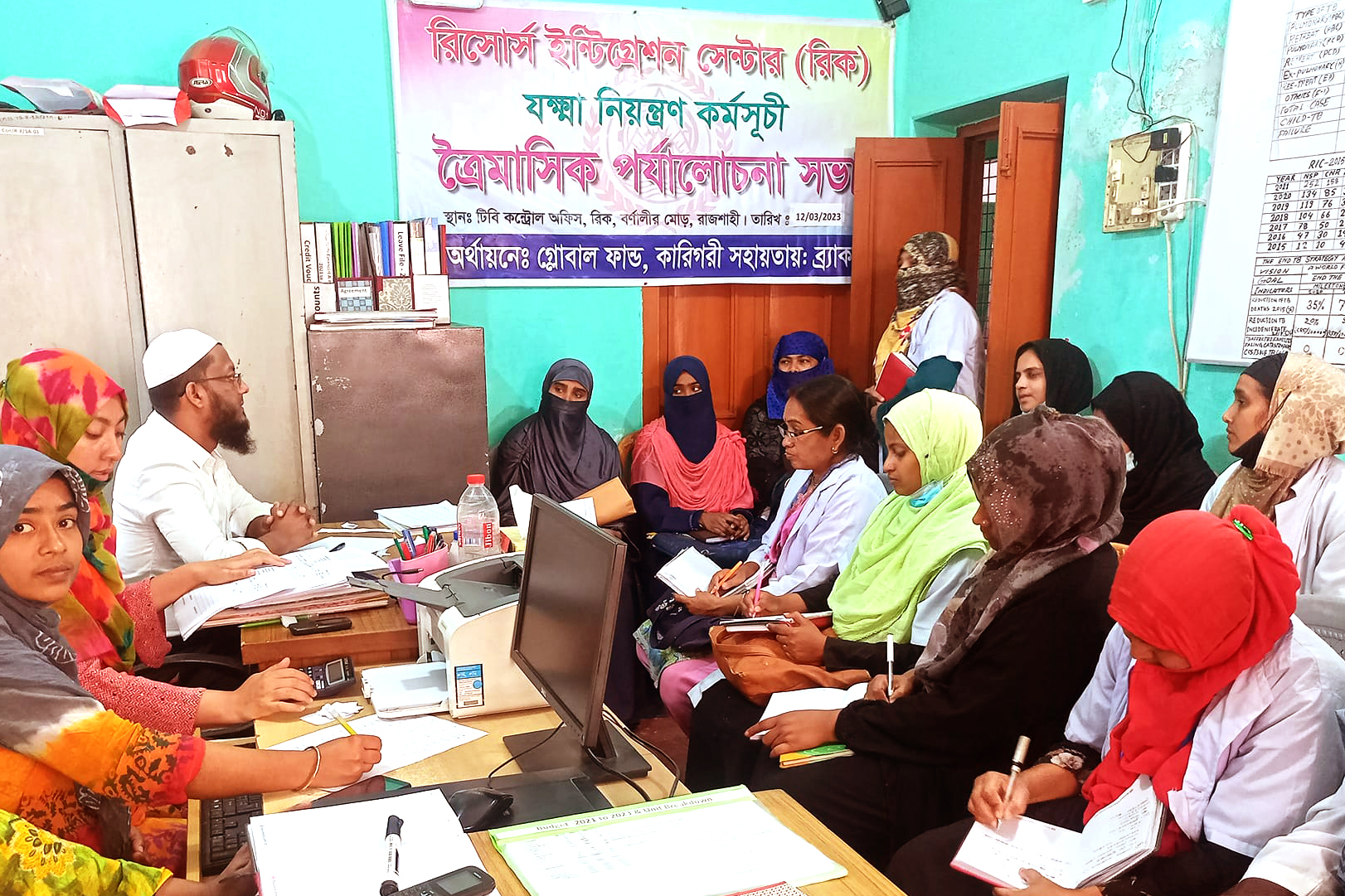
National Tuberculosis Control Programme (NTP): Tuberculosis (TB) has been a major public health concern for Bangladesh for decades. RIC has been implementing the National Tuberculosis Programme, Global Fund (GFATM/BRAC) project with the technical and financial support of BRAC in 10 Wards of Rajshahi City Corporation. The overall goal of TB control is to reduce morbidity, mortality and transmission of TB until it is no longer a public health problem.
RIC’s frontline community health worker play a pivotal role in connecting individuals with TB control services during household visits and health forums. They disseminate TB-specific messages to the community, identify presumptive TB patients and refer them, for sputum examination, to the government health complex or peripheral laboratories under the project. The frontline health workers also ensure regular intake of medicine for identified TB patients through DOTS. They refer complicated TB patients to health facilities for further treatment and for proper management of side effects and other complications during TB treatment.
The project approach towards the diagnosis and treatment of TB focuses on community level education and engagement. The programme conducts orientation with different stakeholders of the community to engage them in efforts to identify TB patients, ensure treatment adherence and reduce stigma surrounding TB. The stakeholders include cured TB patients, local religious leaders, school going children, girls' guides and scouts, other NGO workers, formal and non-formal care providers like graduate private practitioners, village doctors and pharmacists.
During the reporting period through operating micro scoping center total 510 TB patient identified on different categories. Social service provided to 787 patients. Nation TB day was also observed through organizing different events. Through this programme RIC is contributing towards National Plan of reducing death rate of the TB affected people 10 in 01 lac by 2025 and 04 in 01 lac by 2030.
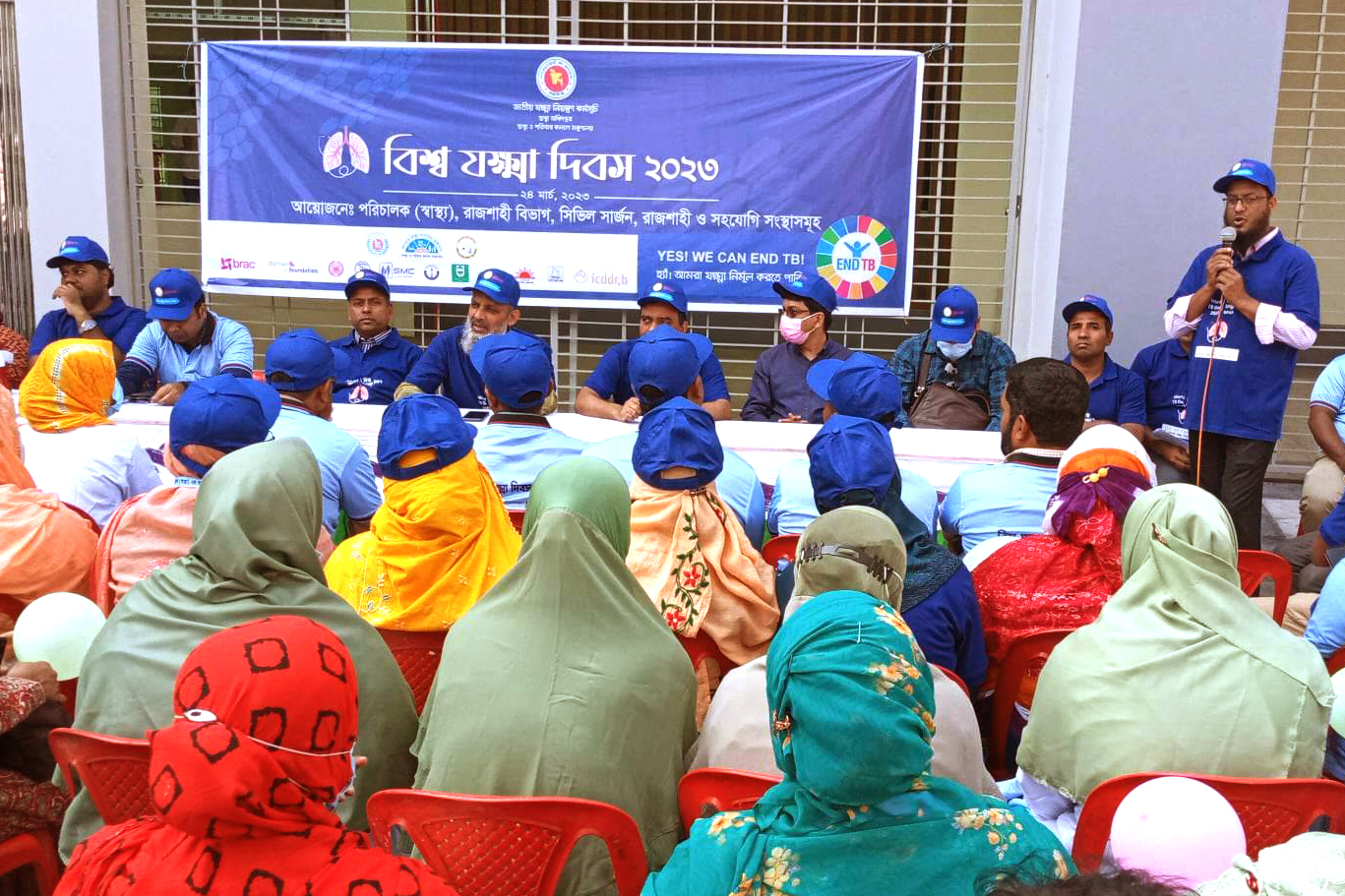
The programme conducts orientation with different stakeholders of the community to engage them in efforts to identify TB patients, ensure treatment adherence and reduce stigma surrounding TB.
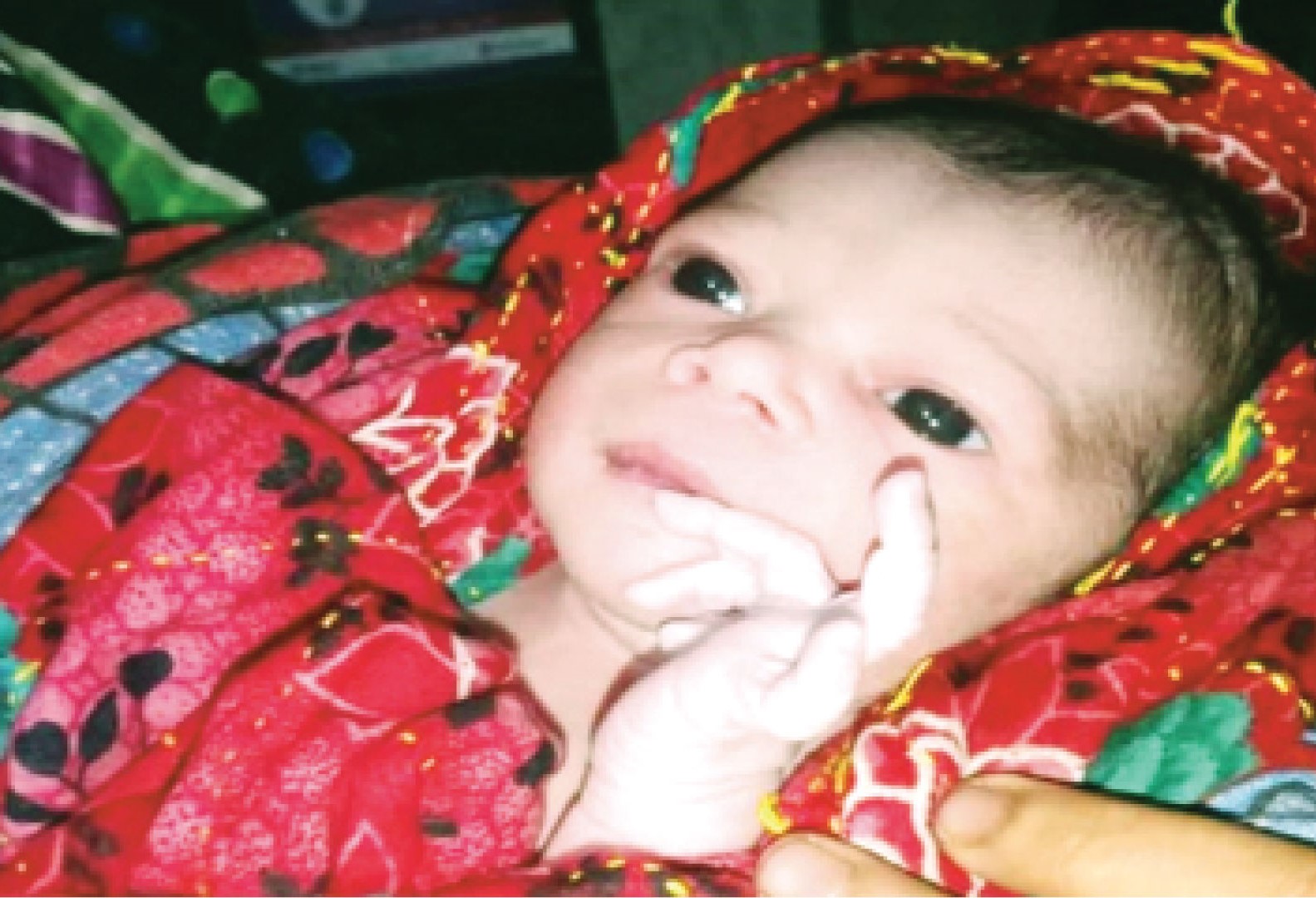 MaMoni Maternal and Newborn Care Strengthening Project (MAMONI MNCSP): RIC implemented USAID’s MaMoni Maternal and Newborn Care Strengthening Project (MaMoni MNCSP) project since 26th April 2018 to 25th April 2023 implemented in Cox’s Bazar, Feni, Noakhlai, and Sandwip Island, Chittagong districts and supported most of the public facilities including District Hospital (DH), Mother and Child Welfare Centers (MCWCs), Upazila Health Complexes (UHCs), Union (USC) and some private facilities. Among the three districts and one upazila Sandwip Hatiya, Sandwip, Kutbdia, Moheshkhali, and Saint Martin, Teknaf is mostly under served/hard to reach areas.
MaMoni Maternal and Newborn Care Strengthening Project (MAMONI MNCSP): RIC implemented USAID’s MaMoni Maternal and Newborn Care Strengthening Project (MaMoni MNCSP) project since 26th April 2018 to 25th April 2023 implemented in Cox’s Bazar, Feni, Noakhlai, and Sandwip Island, Chittagong districts and supported most of the public facilities including District Hospital (DH), Mother and Child Welfare Centers (MCWCs), Upazila Health Complexes (UHCs), Union (USC) and some private facilities. Among the three districts and one upazila Sandwip Hatiya, Sandwip, Kutbdia, Moheshkhali, and Saint Martin, Teknaf is mostly under served/hard to reach areas.
The RIC working project area is covering approximately 10.24 million populations in 24 Upazilas. It has been supporting the 03 District Hospital, 03 Mother and Child Welfare Center (MCWC), 21 Upazila Health Complexes (UHC), 01 Upazila MCWC and 172 Union Health and Family Welfare Centers (UH&FWC), and 06 Union MCWC directly.
Below is the status of some key project performance monitoring indicators for the reporting year:
- ANC visit in public health facilities increased by 28% in Cox’sbazar 21% in Noakhali 80% in Feni, 52% Sawndip
- Conduction of delivery at the public facilities increased tremendously.End of the year 2022 public facility delivery in Cox's Bazar was 33 percent (Increased 11%) which in baseline was 22 percent, in Noakhali 33 percent (Increased 13%) which in a baseline was 20 percent point, in Feni 35 percent point (increased 9%) which in baseline was 35 percent point and in Sandwip 25 percent point women delivered in the public facility (increased 20 %) where the baseline was 22 percent
- The eligible couple accepted the post partum IUCD and PPFP any method in every MaMoni RIC intervention district under Cox’s Bazar and Noakhali region
- Application of 7.1% chlorhexidine for newborn umbilical cord care at public facility delivery was 100 percent in all districts and Sandwip, Chattorgram end of the year 2022
- Providing BEmONC services in RIC intervention area increased, 7 public health facilities were providing BEmONC services; 21 facilities providing CEmONC services and 11 facilities were providing midwifery led care services at the end of the year 2022
- Status of 24/7 UH&FWCs relating to the provision of normal delivery services at the end of 2022 qualified project criteria Cox's Bazar 47 out 52, Feni 22 out of 39, Noakhali 31 out of 55 Sandwip 6 out of 11. The figure indicate significant increased compare to baseline
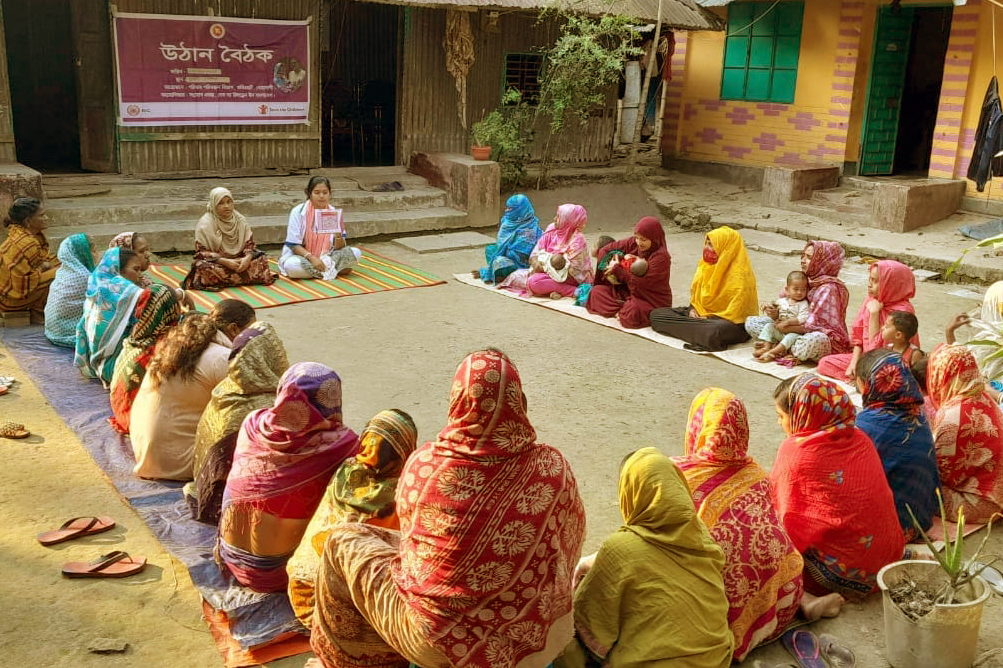 BGD-First Time Parents Innovations (SHONGZOG): The Shongzog project is an initiative to work with pregnant women aged 15–24 years mothers and with their children under 12 months of age.
BGD-First Time Parents Innovations (SHONGZOG): The Shongzog project is an initiative to work with pregnant women aged 15–24 years mothers and with their children under 12 months of age.
This works with the Department of Health and Family Planning of the Government and project of the Clinical Contraception Services Delivery Program Unit of the Department of Family Planning.
RIC has been implementing the project as a partner of Save The Children Bangladesh with the funding support from the Bill & Milinda Gents Foundation with an aim to increase the rate and quality of postnatal care among 15 to 24 year old first time mothers and to increase the uptake of postnatal family planning.
The project is implementing in 39 Unions of Kabirhat, Companyganj, Begumganj, and Subarnachar Upazilas of Noakhali District
Major activities implemented during the period are the Identification/Stocktaking of the first time mothers (15-24) # 2215, providing antenatal care at the service center # 2511, completion of predischarge checklist # 2495, providing postnatal care # 7632, suggesting postnatal family planning system # 7573, completion of home delivery # 138, algorithm checklist preparation # 137.